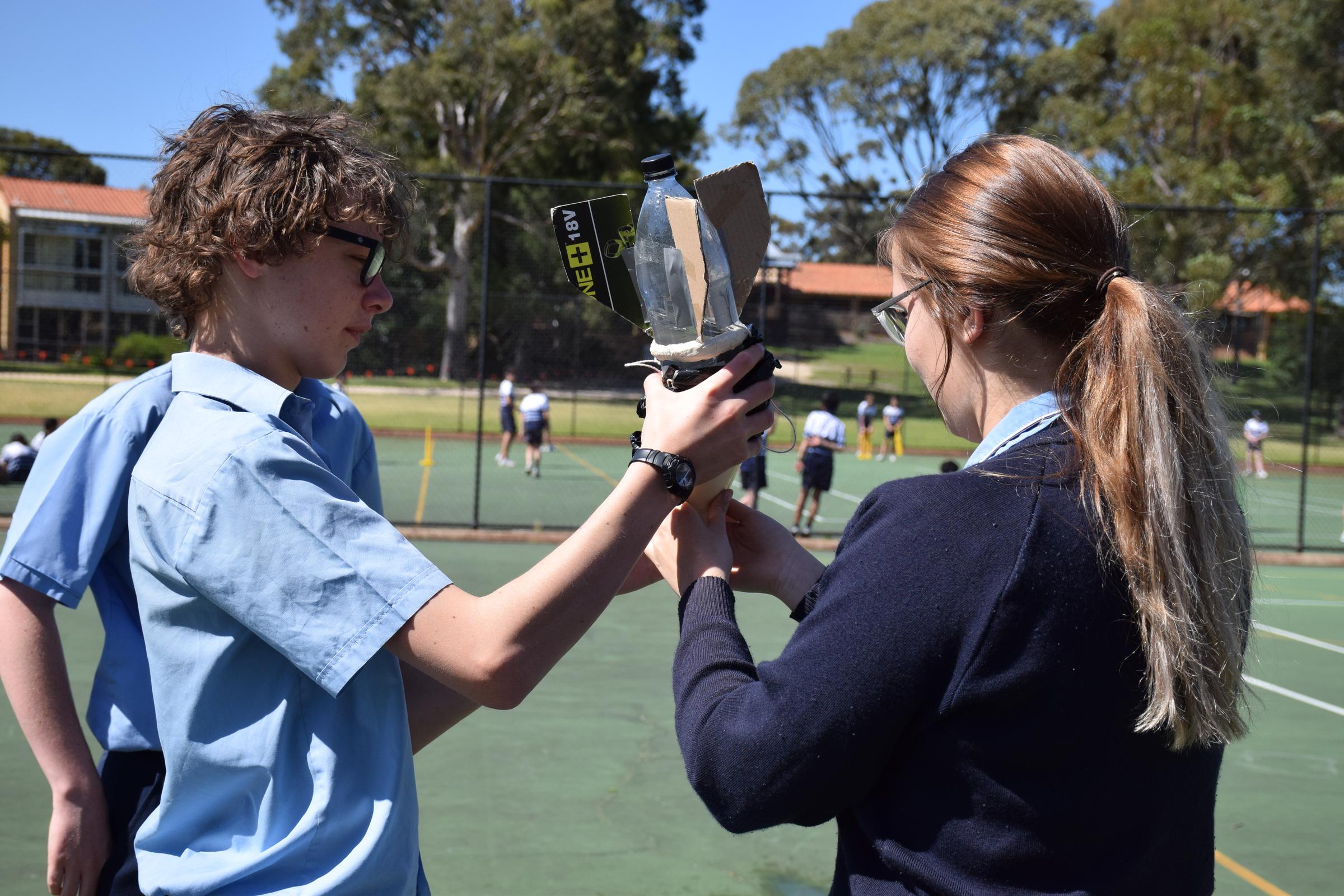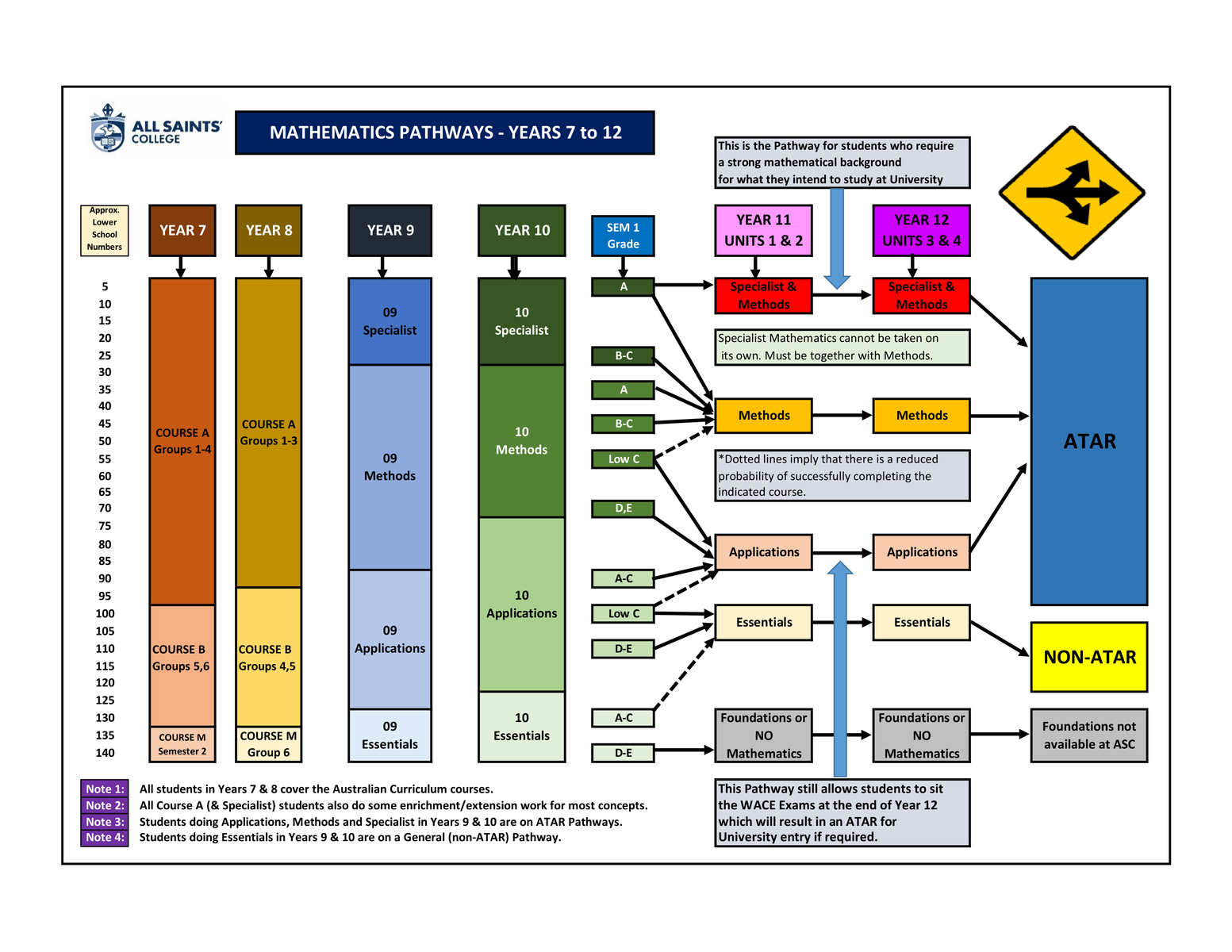YEAR 10 COMPULSORY MESH OPTIONS

MATHEMATICS LEARNING AREA
Numeracy
Numeracy is the ability to effectively apply Mathematics in everyday recreational, work and civic life, and is vital to the quality of participation in society. In order to be numerate, students need to learn Mathematics and the language of Mathematics, to make sense of Mathematics, to be confident in their use of Mathematics, and to see how it can help them make sense of their world and the world of others.
Numeracy is a fundamental component of learning across all areas of the curriculum.
The development and enhancement of students’ numeracy skills and understanding are the responsibility of all teachers. The teaching of Mathematics, however, plays a particularly important role.
In Mathematics, the early adolescent of Years 8, 9 and 10 typically progresses from the concrete to the abstract. The mathematics content increases, with a broadened focus on the development and application of understandings.
At the beginning of this phase of development, early adolescent learners commence their journey into the world of universal ideas, learning about the processes of discovery and the implications for change. They successfully complete activities focusing on problem solving. Subsequently, they typically begin to move from reflecting on local and real-world experiences to considering increasingly complex and abstract mathematical concepts and ideas. They value opportunities to explore new ideas in depth, commonly in cooperation with their peers.
By the end of the Early Adolescence phase of development, students begin to use more sophisticated cognitive strategies. They investigate purely mathematical ideas and relationships, gaining experience with the cycles of conjecture, explanation, and justification.
At All Saints’ College, the Mathematics Curriculum in Years 9 and 10 is founded on the following principles of learning:
- Motivation and purpose: Learning experiences should be motivation and their purpose clear to the student.
- Inclusivity and difference: Learning experiences should respect and accommodate differences between learners.
- Independence and collaboration: Learning experiences should encourage students to learn both independently and from and with others.
Courses
There are four available choices in Year 10. Different pathways will be recommenced based on students' performance.
Students can choose from:
- Mathematics Essentials 10 - Least challenging and not suitable for ATAR students.
- Mathematics Applications 10 - For students wishing to pursue university courses that do not require a strong Mathematics background.
- Mathematics Methods 10 - For capable students wishing to pursue university courses requiring higher Mathematics.
- Mathematics Specialist 10 - For highly capable Mathematics students.
which then lead on to courses Essentials (non-ATAR), Applications (ATAR), Methods (ATAR), Specialist (ATAR) and Year 11 Mathematics Methods ATAR (Advanced Placement required) in Years 11 and 12.
Extension
All Saints’ College has established itself as one of the leading schools in Western Australia in providing opportunities for gifted and talented mathematicians, with extraordinary success in State and National Mathematics competitions. With a dedicated Extension teacher in Mathematics, the program at All Saints’ College is the envy of many schools.
To view a larger image of the Mathematics Pathways flowchart, please click HERE.
ENGLISH LEARNING AREA
Year 10 English provides a transition to the Year 11 and 12 English and Literature courses. Students continue to develop their skills across the three learning objectives of Language, Literature and Literacy, and they are required to respond analytically as well as creatively to their reading and viewing. A variety of text types are studied across a range of genres that will increase in complexity as the year progresses.
The text types studied in Year 10 English include fiction texts such as novels, short stories, plays, feature films and poetry, and non-fiction texts such as posters, documentary and biographical writing. Students are required to respond to these texts analytically and consider how the texts have been constructed to encourage specific responses from their target audiences. There is also the opportunity to apply their knowledge of how texts work to create their own texts. To ensure students are prepared for Year 11 courses, the Year 10 course aims to provide an experience of both English and Literature.
There are three options for studying English in Year 10:
- English Empowerment (for students who require additional support in English)
- English Engagement (for most students)
- English Enhancement (for students invited to be part of the Extension program)
Students who would benefit from being extended further than the level of Year 10 English may be invited to enrol in Year 11 ATAR English.
SCIENCE LEARNING AREA
Based on the Western Australian Curriculum, our Year 10 courses extend students’ understanding in the major disciplines of science. The four disciplines covered are:
- Physical Sciences: energy changes, forces and the Laws of Motion.
- Chemical Sciences: Atomic structure, organisation of the Periodic Table and chemical reactions.
- Biological Sciences: DNA, genetics, evolution and natural selection.
- Earth and Space Science: The theories of origin of the Universe, global systems and the carbon cycle.
Students have the opportunity to undertake the study of each discipline in turn across the year, which provide them with valuable insight into their possible choices for Year 11 subjects. Students are placed in non-streamed classes. An emphasis is placed on the teaching and learning of key concepts and application of knowledge in order to best prepare students for Year 11 and beyond. Students will also extend their understanding of the nature of scientific inquiry and how to critically analyse data collected during experiments and investigations. Students will sit examinations at the end of Semester 2.
Science Gateways 10
Students who have encountered challenges with the acquisition of scientific understanding will be invited into the Year 10 Science Gateways class. This smaller class covers the same key content areas in less depth and with more focus on scientific inquiry and practical based skills. There is no Semester 2 examination in this course.
HUMANITIES AND SOCIAL SCIENCE LEARNING AREA
Students in Year 10 will cover the four key disciplines of Humanities and Social Sciences (HASS):
- Civics and Citizenship
- Economics and Business
- Geography
- History
The units of study are based upon the Western Australian Curriculum. Each subject integrates the Humanities inquiry process, skills and the general capabilities. This course provides insight to possible Upper School course choices and emphasises the development of collaboration, independence and rigour as preparation for Year 11. Students will sit examinations at the end of Semesters 1 and 2. Students learn in non-streamed (heterogeneous) classes.
Civics and Citizenship considers 'Justice at home and overseas', Economics and Business examines 'Economic performance and living standards', Geography explores 'Environmental change and management' and 'Geographies of human wellbeing' whilst, History investigates 'The Modern World and Australia' in two depth studies - 'World War II' (1939-1945) and 'Rights and Freedoms' (1945 – the present).
